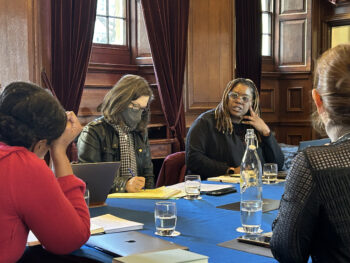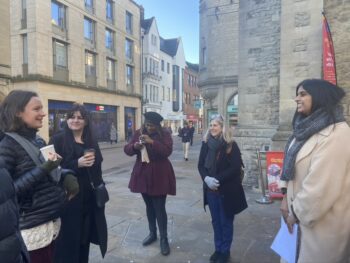Newly formed Oxford-Vanderbilt Gender, Race, and Political Theory Project meets
A group of scholars who work at the intersection of gender and race in the discipline of political theory recently convened for the first time as part of the new Oxford-Vanderbilt Gender, Race, and Political Theory Project. The project is being co-convened by Shatema Threadcraft, associate professor of gender and sexuality studies, and Oxford’s Sophie Smith, associate professor of political theory.
Read the Q&A with Threadcraft who discusses the new group and their first meeting in January 2023 at the University of Oxford in the U.K.
Q. Tell us about the start of this project?
A. Professor Smith and I wanted to bring together established and emerging scholars who work at the intersection of gender and race in the discipline of political theory. We also wanted to highlight the work being done to transform and expand the discipline of political theory at both Oxford and Vanderbilt, places that you might not expect to find this kind of work.
When I came to Vanderbilt the dean was gracious enough to offer his support so that we were able to invite great people from other universities to take part in the project. Because of the project, Sophie, graduate students at Oxford and Vanderbilt, and I, all had the opportunity to speak and think with scholars who have done pioneering work on the political theory of Frederick Douglass, Harriet Jacobs, Domingo Sarmiento, Ida B. Wells, W.E.B Du Bois, José Vasconcelos, James Baldwin, Hannah Arendt, Toni Morrison and Saidiya Hartman, on hemispheric political thought, as well as Black and Indigenous-led social movements in the Americas. We are confident that these connections will have a considerable impact on the thinking and research of all attendees.
Q. What is the mission of the project? What do you hope to accomplish?
A. Our goal is to create a supportive scholarly community. We want scholars who are doing this work to have the opportunity to get together, read, and discuss works in progress. We want to introduce emerging scholars to Black and other women of color feminist texts and methods that they may not encounter in their courses of study elsewhere.
Q. What was discussed during your first meeting?
A. Students asked Lawrie Balfour, Juliet Hooker, Deva Woodly, and I to define political theory.
We spoke about how recent scholarship has brought many overlooked figures into the discipline of political theory. I am very happy, for example, that there is now so much great work being done on W.E.B. DuBois. There is less work being done on incredible thinkers like Barbara Smith, June Jordan, and Frances Beale, and we’d like to do all that we can to ensure that they and thinkers like them get their due within the discipline.
We spoke about the struggle for racial justice in the post-Dobbs world, and about the intersections of race and trans politics.
 Q. Some Vanderbilt political science graduate students attended. Tell us about their involvement.
Q. Some Vanderbilt political science graduate students attended. Tell us about their involvement.
A. Katerina Traut and Rebecca Townsley sat in on the Oxford Political Theory MPhil seminar class discussion with the renowned democratic and feminist theorist Bonnie Honig, of Brown University. They took notes at the manuscript workshop and participated in the panel discussion and took part in a seminar on gender and mass incarceration.
They also had the opportunity to meet with an editor from Oxford University Press to discuss their dissertation projects/future book proposals. They wrote blog posts on their overall experience and on the Uncomfortable Oxford Tour, which is organized by “an academic-led organization dedicated to raising awareness about the ‘uncomfortable’ aspects of history. Through walking tours, we generate discussions about racial inequality, gender and class discrimination, and legacies of empire.”
